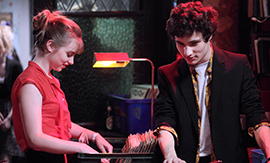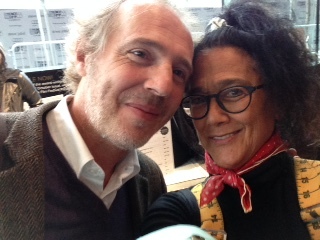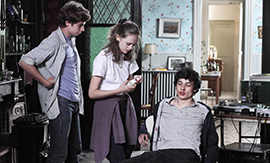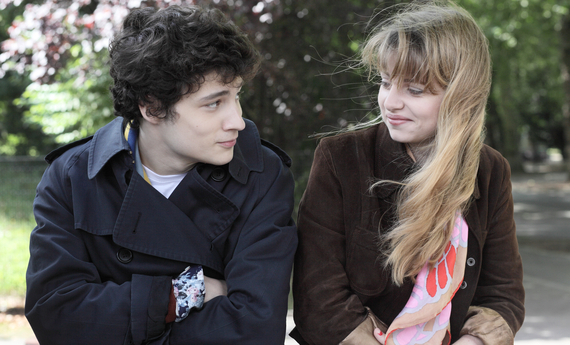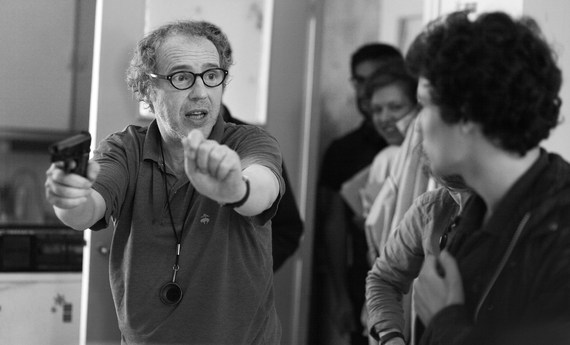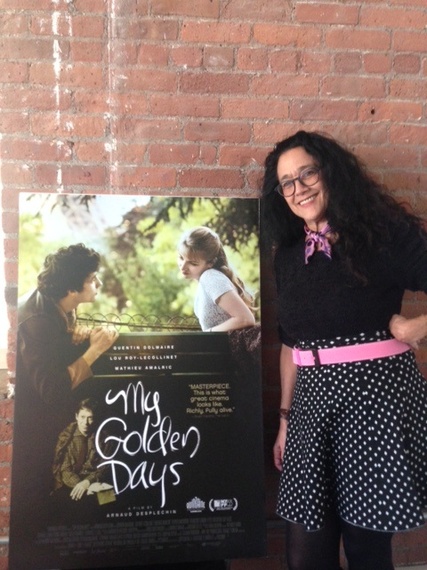We've had the Golden Age; the Golden Goose; Golden Oldies; Golden Books; the Golden Globes. And now we 've got My Golden Days.
It's the latest cinematic pearl from French filmmaker Arnaud Desplechin, following a string of intricate and touching tales including My Sex Life...or How I Got into an Argument; Kings & Queen; Jimmy P; and A Christmas Tale.
Memory ... it's a literary theme as old as man (and woman) kind, from Plato's wax tablet to Marcel Proust's madeleine. And you might remember Shakespeare's famous ghost who instructed Hamlet to get revenge on his father's murder, ending his haunting speech with those unforgettable words, Remember Me.
Even Adam and Eve were probably trying to remember where the Garden of Eden was, locate the apple orchard, get directions to the Tree of Good and Evil, and determine what exactly happened with Adam's rib.
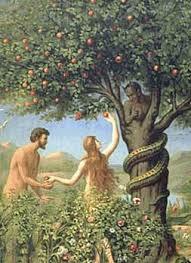
Photo Credit: www.kidsbiblestoriess.blogspot.com
Now we can add Monsieur Arnaud Desplechin to the list of notable "memor-o-philes" or, as I like to call them, the "remember"ists.
Even the word souvenir -- a memento or remembrance from the past -- is part of the film's French title: Trois Souvenirs de ma Jeunesse. Literal translation? Three Memories of my Youth.
It's not just literature that's memory-friendly. Musicians and composers love songs about memory. There's the evocative Try to Remember from Off-Broadway's The Fantasticks. In the French film classic Gigi, Maurice Chevalier sings I Remember It Well to Hermione Gingold in Trouville-sur-Mer against a periwinkle sky at the golden-ochre hour of dusk. And Sinatra croons the famous Irving Berlin lyrics: "You promised that you'd forget me now. But you forgot...to remember."
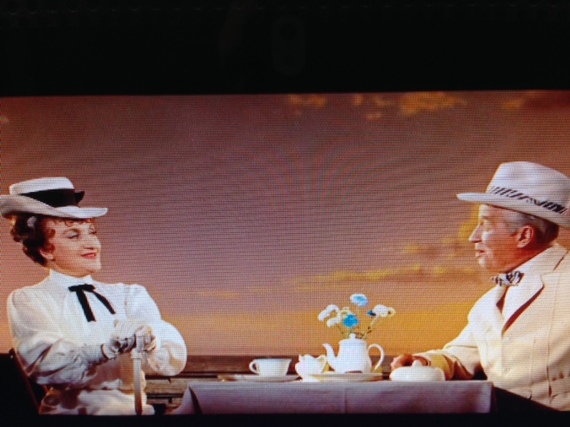
Hermione Gingold and Maurice Chevalier in Gigi
Photo courtesy of www.tcm.com
We all seem a bit obsessed with remembering. I remember the exact paisley outfit I was wearing the teen-age moment I first heard Simon and Garfunkel sing April Come She Will. Whenever I catch even a faint whiff of petunias, I'm transported to the very street in Provincetown, Cape Cod, where my family rented a summer cottage. I remember the pumpkin-siena colors and striation of the leaves in the park the first day my father took me to fly a kite; the specific smell of my Mom's matzoh ball soup wafting through the apartment when I was sick in bed; and the detailed pattern on her silk dress when she invited the Gellers over Saturday nights for orange marmalade-glazed chicken. I also remember the angle of the bed my mother lay in when she was crying in pain from her malignant melanoma.
Baby boomers all seem to remember exactly what they were doing on Nov 22, 1963, the day John F. Kennedy died, and where they were on July 20, 1969, as Buzz Aldrin landed on the moon.
We keep journals, write memoirs, maintain archives, collect audio and video files. We snap multiple images of a ratatouille dish instead of tasting it; take selfies, compile photograph albums, and scrutinize Instagram instead of simply appreciating the moment. And yet we (myself included) savor the actual moments spent rekindling the nostalgia, stoking those memories.
I've jogged miles down the beach, dragging a piece of driftwood bigger than myself to literally hang onto a memory, to preserve the physical existence of my magnificent experience.
When I first met Monsieur Arnaud Desplechin, at the New York Film Festival 53, I remember a spontaneous dialogue, a joyous experience that contained no driftwood, but instead, a most memorable conversation, punctuated, of course, with a selfie.
Ironically I was wearing ruler suspenders, mindful of one of M. Desplechin's incredible details in My Golden Days - in one scene the Minsk refusenik (a tailor, perhaps) had a tape measure around his neck when he greeted the young Paul Dedalus and his Jewish activist friend Marc "Zyl" Zylberberg.
It seems French filmmaker Arnaud Desplechin addresses both the past and the present with equal intensity. In My Golden Days, he juggles a delicate balance between steeping in nostalgia (captured in detailed scenes of Paul's childhood) and living in the now. In real life, the adult Desplechin reveals a boyish curiosity, 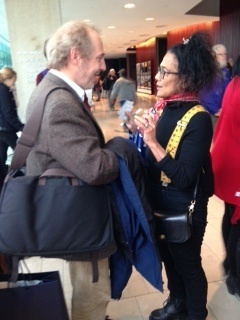 and speaks of his own family with a glimmer of reminiscence. Raised by parents who loved books and films -- they had 'an appetite for literature and culture,' which trickled down to himself, his brother (an actor) and sisters (both writers) -- he remembers the lively conversations in the household. Although his father traveled widely in his salesman career, Desplechin described elements of a most enriching childhood.
and speaks of his own family with a glimmer of reminiscence. Raised by parents who loved books and films -- they had 'an appetite for literature and culture,' which trickled down to himself, his brother (an actor) and sisters (both writers) -- he remembers the lively conversations in the household. Although his father traveled widely in his salesman career, Desplechin described elements of a most enriching childhood.
Adolescent youth was a big attraction for Desplechin in creating My Golden Days, a prequel to "My Sex life," made some 18 years earlier. This time Desplechin decided to approach the Paul and Esther story with teenagers, explaining that the young generation enlightened the film. In a sort of philosophy of opposites, Desplechin sums up, "I brought heaviness and they brought lightness. We split the job!"

Quentin Dolmaire, Theo Fernandez, Yassine Douighi, Raphael Cohen, Pierre Andrau
Photo Credit: Magnolia Pictures
Desplechin plays with time like a child's yoyo, gliding back and forth in reverie, reality and remembering, dividing the film into three golden intertwined segments: Childhood, Russia and Esther.
In Part I, Childhood, the words "Je me souviens" are repeated three times, conjuring up Dorothy in Oz, clicking her red heels three times to go home to Kansas. I flashed back to the golden/yellow crayon marker (remember the one we used to underline high school textbooks to help us study for exams?), perhaps highlighting our true desire to remember.
The film opens in Tajikistan when Paul is about to return to Paris, then rewinds life's tape, as Desplechin examines Paul's childhood memories in Roubaix, from angry outbursts to naive romantic flirtations. We watch him bond with his Stand By Me-ish schoolboy buddies, confront West Side Story-ish gang rivals, and embark on a risky high school trip to Minsk to help refuseniks.
My Golden Days evokes the sparkling moments of our past...preserved in a jar that cannot be invaded. Despite the innocence of youth, though, Desplechin illustrates some unmistakable thorns: Paul's provocative relationship with his suicidal mother; his short-tempered father's beatings; his jealous competitor's roughing him up; nine-year-old departure from home. Throughout all the pain, he "feels nothing."
It's a heartbreaking and humorous portrait of firsts: first exile; first travel adventure; first love...of leaving behind our dearest memories, our pure childhood feelings, our golden days, which perhaps are tinged with golden brown edges.
Abraca-A-rnau- Dabra
Like a clever magician, Desplechin fills his script with surprise twists and playful reversals of time. In Tajikistan, Paul's lover implores: "Cast a spell on me so I'll forget you immediately." After all, most of us want to erase the vivid loves that will hurt us the most.
As a child, Paul is uncannily mature, making serious adult decisions and life changes, risking rejection in pursuing Esther, leaving home, moving in with his great-Aunt. Ironically, as Paul ages and suffers increasingly in romance, he grows more impatient, even juvenile.
Royal Mountains, Majesty and Melting
When we first meet Esther, she is a rock of confidence, with a royal Queen Esther-like stature (to Paul, she "exists like a mountain"); as she finds love, fragility and humanity, she grows more vulnerable.
From Arnaud to Aristotle: The Whole is Greater Than the Sum of its Parts
In this prequel to My Sex Life..Or How I Got into an Argument released 20 years ago, Paul Dedalus and Esther tenderly and painfully struggle to find the right fit...they can't seem to remember how they smoothed out each others' rough edges when they first met. Despite their glaring differences they were a perfect match ... each one needed the other to become whole. As time goes by, gloom seeps out beyond the boundaries of their bodies and souls, like paint spilling outside the canvas. The two jigsaw puzzling pieces just don't quite fit snugly together anymore.
The Glory Details
Memories are in the detail. They are the melancholy and joyous pieces of our lives, and Desplechin reminds us of that. Repeated references to remembering are dotted throughout the film like sprinkles on an ice cream cone. From the opening scene in Tajikistan, Paul's lover states, "I'd like to REMEMBER you when I'm a very old lady"; Paul's interrogator questioning him when they find his double - ("Who are you? I can't REMEMBER"). In Minsk, the boys are instructed they "must REMEMBER the street address, street car...station." When the infatuated Paul is ecstatically teaching Esther to play GO, his new pupil says, "I can't REMEMBER it all at once"...and Paul really doesn't care. Why should he? He's in his glory.
Nothing is Everything
Seinfeld made a career out of it. As he told NBC at their tv pitch meeting, "it's a series about nothing. " And everything. Paul Dedalus continues to feel nothing, in repeated scenarios: after childhood beatings by both his father and later by Esther's gang of jealous rivals; after his father; after he knocks himself out, staging a mock mugging to avoid police arrest in Minsk.
As time goes by, though, Paul feels every stinging moment of poignancy: fainting at the news of his mentor's death, recounting the story of his life-changing adventures with Zyl; living the Biblical agony and ecstasy of his entanglement with Esther.
Nothingness becomes everything-ness, sort of like Plato - you don't see the form unless you realize the space.
Paul may feel nothing, but we, the audience, hear many things. The soundtrack is a startling mix of old and new, classical and pop, from punk to funk, from The Specials (I Can't Stand it) to George Clinton to Roxanne Shanté.

Cosmic Words of Comic Wisdom
Desplechin's playfulness with words and ideas would have made even Plato rethink his dialogues. When Paul flirts with Esther, he admits that he's rusty and impressed by his competitors: "I'm no pick-up artist," to which Esther wittily responds, "They talk crap - that's what's so funny."
His words on sisterhood (and the lack of it) might set the feminists on their head. Esther laments, "I don't dislike girls. They dislike me... Your sister's blabber hurts my boobs." Gloria Steinem, eat your heart out.
Even the acronyms are startlingly funny. At a party, Esther finds a sassy way to reject a suitor asking her to dance. - N.O.Y.L. (Not On Your Life).
In a world of right angles, Arnaud Desplechin sees a diagonal route. It's the art of the unexpected. When his prospective mentor, African-American anthropologist, female Professor Behazian, rejects his application, he persists with a novice, devil-may-care approach: "You need one bad seed..to reassure the brilliant ones."
One for the Books
Desplechin incorporates his love of literature throughout the film: on the train to Minsk, Paul and Zyl are reading two classic 19th century novels: Stendahl's Le Rouge et le Noir and Edgar Allan Poe's sea adventure, The Narrative of Arthur Gordon Pym.
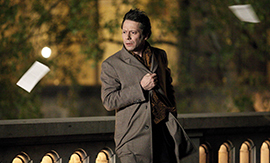
Mathieu Amalric (Paul Dédalus, adult)
Photo Credit: Magnolia Pictures
Books fill the walls of his dear professor's study; we see Paul reading in bed as a poor Paris student; reading together with Esther on his lap amidst her weekend visit; reading in frustration after hearing the devastating news of longtime friend Jean-Pierre stealing Esther; finally, loose pages of ancient Greek literature go flying furiously by at the end of the film.
Subjective, Subjunctive, Seductive Tense
Whether or not Paul is a wandering Odysseus, there are multiple references to the ancient Greeks - from Paul's studies of Plato with Esther to his study of the Greek language with the young couple who let him crash in their spacious apartment. When Paul questions a grammatical tense, his host responds with an example; OPTATIVE tense. Would that you would not Seduce my Spouse.
Wondering, Wandering
Like Paul, Desplechin's own father was a salesman; is that the backdrop for Desplechin or Dedalus the wanderer? the setting for the travel motif? Paul resembles Odysseus, setting sail, ever in exile, leaving home at the age of nine, leaving Roubaix for Minsk, leaving for Paris, leaving for Iran, Dushanbe, Turkmenistan....eventually returning home.
Turns out Desplechin seems happy on his own turf, working night and day on new scripts, occasionally adapting a novel or play, always loving the challenge of a new story, with its "tricky lines" and "surprising situations."
From Tor-ment to Men-tor
After the numbing mother/son relationship, several older women become surrogate mothers. His great aunt welcomes him into her home, strokes his hair; Professor Béhanzin invites Paul into her special world of books and records, sharing her deep passion for music. In one of the film's most intimate scenes, she introduces Paul to a piece close to her heart: a sacred Hugo Wolf song (Stravinsky's last orchestration before his death). There is no dialogue -- simply a listening session. Yes, Desplechin, silence truly is golden. Paul never truly recovers from the wound with his suicidal mother, but finds true solace with his mentor. He starts to heal only after the Professor's death, when he finally realizes he is an orphan.
Bewitched Bothered and Abandoned
In another ironic twist, Paul's loyal friend Jean-Pierre, always the reliable one, always there to see him off and console Esther, presents a romantic threat. In a sad awakening, Jean-Pierre realizes all his childhood friends eventually leave Roubaix; his destiny is to stay behind. "I'm the keeper of the childhood you're all done with."
Arnaud Desplechin seems an independent spirit marching to his own tune, following no Golden Rule except the rules of Desplechin, discovering new faces amongst the familiar (Catherine Deneuve, Summer Phoenix and Mathieu Amalric).
Instead of asking his new actors to see My Sex Life, he encouraged them to create their own Paul and Esther personas. Despite his focus on remembering, he salutes the here and now.
Even amidst the solemn realization of life's melancholy, Desplechin sees the lighter side. In the Q and A following a recent screening, he adds a touch of humor. An audience member questioned why Paul, about to return to Paris and still revering Esther, takes a lover in Tajikistan. In an instant, Desplechin responds, "Well, he's not a monk."
Desplechin tells a tale of memory, revealing life's prominent moments, our dreams, our losses, our angst, our joys, our disappointments, our melancholy, our passions, our remembrances. He weaves a timeless tapestry, glistening with silver threads and GOLDEN DAYS.


